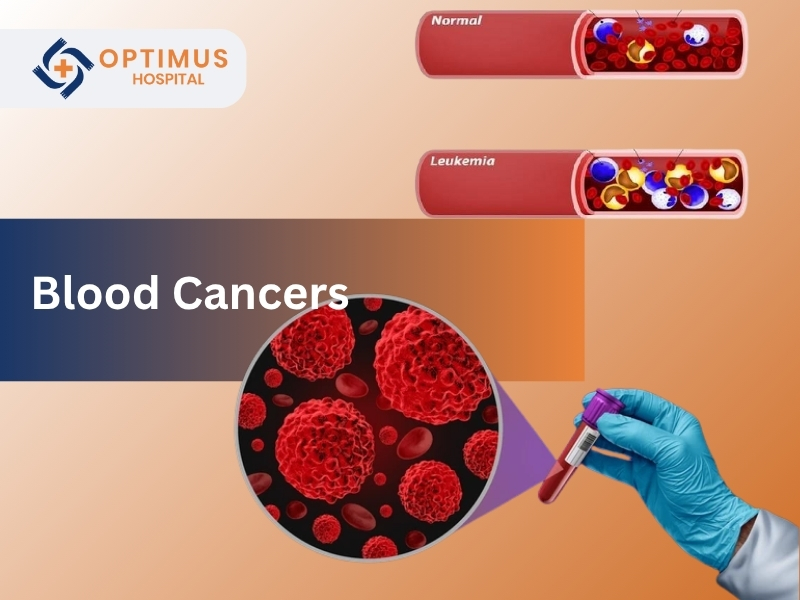When it comes to cancer, early detection can save lives—especially with blood cancers. But the challenge is that the early signs often look like common illnesses, making it harder to recognize. That’s why it’s essential to know what to look for, what symptoms to never ignore, and where to go for the right treatment.
In this blog, we’ll explain the early signs and symptoms of blood cancers, types of blood cancers, and how to choose the best institute or hospital for timely treatment and care.
What Are Blood Cancers?
Blood cancers, also known as hematologic cancers, affect the blood, bone marrow, or lymphatic system. They interfere with how blood cells are made and how they function. Normally, your body makes healthy blood cells that fight infections, carry oxygen, and stop bleeding. But in blood cancer, abnormal cells grow uncontrollably and crowd out healthy ones.
The three main types of blood cancers are:
-
Leukemia
-
Lymphoma
-
Multiple Myeloma
Each one affects different parts of the blood and immune system, but they share common warning signs.
Why Early Detection Matters
The earlier blood cancer is detected, the more successful the treatment is likely to be. In many cases, patients ignore vague symptoms like fatigue or fever, assuming it’s just the flu. But catching these signs early can lead to quicker diagnosis, more treatment options, and better outcomes.
Early Signs and Symptoms of Blood Cancers
Here are some early symptoms you should never ignore:
1. Unexplained Fatigue
Feeling tired all the time even after proper rest? This may not be normal fatigue—it could be a red flag.
2. Frequent Infections
Your body’s immune system may be weak due to abnormal white blood cells. This makes you catch colds or fevers often.
3. Easy Bruising or Bleeding
Small cuts that bleed too much or unexplained bruises could indicate platelet problems, a hallmark of leukemia.
4. Swollen Lymph Nodes
Painless swelling in the neck, armpits, or groin could be an early sign of lymphoma.
5. Bone or Joint Pain
If bones or joints hurt without injury, especially in children, it may be due to abnormal cell build-up in the bone marrow.
6. Unintentional Weight Loss
Losing weight without changing diet or exercise can be a warning sign of serious illness.
7. Night Sweats and Fever
Drenching night sweats or recurrent fevers could indicate blood cancer, especially lymphoma.
8. Shortness of Breath or Pale Skin
A drop in red blood cells can lead to anemia, which causes breathlessness and a pale appearance.
Types of Blood Cancers – Explained Simply
Let’s break down the three main types of blood cancer in simple terms.
1. Leukemia
This cancer starts in the bone marrow, where blood cells are made. It results in the production of large numbers of abnormal white blood cells. Leukemia can be acute (fast-growing) or chronic (slow-growing).
Symptoms:
-
Frequent infections
-
Fatigue
-
Nosebleeds or bleeding gums
-
Bone pain
2. Lymphoma
Lymphoma starts in the lymphatic system, a part of your immune system. There are two main types:
-
Hodgkin lymphoma
-
Non-Hodgkin lymphoma
Symptoms:
-
Swollen lymph nodes
-
Persistent fatigue
-
Fever and night sweats
-
Chest pain or coughing
3. Multiple Myeloma
This affects plasma cells, a type of white blood cell. It can cause problems in the bones, kidneys, and immune system.
Symptoms:
-
Bone pain, especially in the back
-
Frequent infections
-
Kidney dysfunction
-
Weakness or numbness
How Blood Cancers Are Diagnosed
Getting a correct diagnosis early is crucial. Tests may include:
-
Complete Blood Count (CBC)
-
Bone Marrow Biopsy
-
CT scan or MRI
-
PET Scan
-
Lymph Node Biopsy
Your doctor may refer you to a specialized blood cancer institute for further testing and treatment.
Best Institutes for Blood Cancer Treatment in India
If you or someone you love is facing a potential blood cancer diagnosis, choosing the right hospital can make a big difference. Here are some of the top institutes in India known for treating blood cancers:

